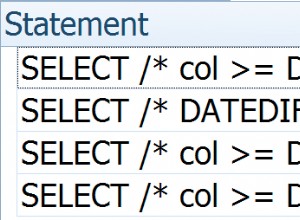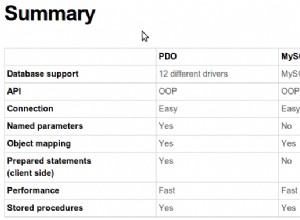Dies ist eine aktualisierte Version der Antwort, die flexibler ist als die vorherige.
Hier ist eine Idee, eine SQL UNION zu verwenden :
-
Wir können die Daten aus den
posts_clausesverwenden filtern, um die SQL-Abfrage ausposts_requestneu zu schreiben Filter. -
Wir erweitern die
WP_QueryKlasse, um unser Ziel zu erreichen. Wir machen das tatsächlich zweimal:WP_Query_Empty:um die generierte SQL-Abfrage jeder Unterabfrage zu erhalten, aber ohne die Datenbankabfrage durchzuführen.WP_Query_Combine:zum Abrufen der Beiträge.
-
Die folgende Implementierung unterstützt die Kombination von
NUnterabfragen.
Hier sind zwei Demos:
Demo #1:
Nehmen wir an, Sie haben sechs Posts, sortiert nach Datum (DESC):
CCC
AAA
BBB
CCC
YYY
ZZZ
XXX
wo der XXX , YYY und ZZZ älter als DT=2013-12-14 13:03:40 sind .
Ordnen wir unsere Posts so, dass Posts nach DT veröffentlicht werden werden nach Titel (ASC) und Beiträgen geordnet, die vor DT veröffentlicht werden sind nach Titel geordnet (DESC):
AAA
BBB
CCC
ZZZ
YYY
XXX
Dann können wir Folgendes verwenden:
/**
* Demo #1 - Combine two sub queries:
*/
$args1 = array(
'post_type' => 'post',
'orderby' => 'title',
'order' => 'ASC',
'date_query' => array(
array( 'after' => '2013-12-14 13:03:40' ),
),
);
$args2 = array(
'post_type' => 'post',
'orderby' => 'title',
'order' => 'DESC',
'date_query' => array(
array( 'before' => '2013-12-14 13:03:40', 'inclusive' => TRUE ),
),
);
$args = array(
'posts_per_page' => 1,
'paged' => 1,
'sublimit' => 1000,
'args' => array( $args1, $args2 ),
);
$results = new WP_Combine_Queries( $args );
Dadurch wird die folgende SQL-Abfrage generiert:
SELECT SQL_CALC_FOUND_ROWS * FROM (
( SELECT wp_posts.*
FROM wp_posts
WHERE 1=1
AND ( ( post_date > '2013-12-14 13:03:40' ) )
AND wp_posts.post_type = 'post'
AND (wp_posts.post_status = 'publish' OR wp_posts.post_status = 'private')
ORDER BY wp_posts.post_title ASC
LIMIT 1000
)
UNION
( SELECT wp_posts.*
FROM wp_posts
WHERE 1=1
AND ( ( post_date <= '2013-12-14 13:03:40' ) )
AND wp_posts.post_type = 'post'
AND (wp_posts.post_status = 'publish' OR wp_posts.post_status = 'private')
ORDER BY wp_posts.post_title DESC
LIMIT 1000
)
) as combined LIMIT 0, 10
Demo #2:
Hier ist Ihr Beispiel:
/**
* Demo #2 - Combine two sub queries:
*/
$today = date( 'm/d/Y', strtotime( 'today' ) );
$args1 = array(
'post_type' => 'workshops',
'meta_key' => 'select_dates_0_workshop_date',
'orderby' => 'meta_value',
'order' => 'ASC',
'meta_query' => array(
array(
'key' => 'select_dates_0_workshop_date',
'value' => $today,
'compare' => '>=',
'type' => 'CHAR',
),
)
);
$args2 = array(
'post_type' => 'workshops',
'meta_key' => 'select_dates_0_workshop_date',
'orderby' => 'meta_value',
'order' => 'DESC',
'meta_query' => array(
array(
'key' => 'select_dates_0_workshop_date',
'value' => $today,
'compare' => '<',
'type' => 'CHAR',
),
)
);
$args = array(
'posts_per_page' => 5,
'paged' => 4,
'sublimit' => 1000,
'args' => array( $args1, $args2 ),
);
$results = new WP_Combine_Queries( $args );
Dies sollte Ihnen eine Abfrage wie diese geben:
SELECT SQL_CALC_FOUND_ROWS * FROM (
( SELECT wp_posts.*
FROM wp_posts
INNER JOIN wp_postmeta ON (wp_posts.ID = wp_postmeta.post_id)
INNER JOIN wp_postmeta AS mt1 ON (wp_posts.ID = mt1.post_id)
WHERE 1=1
AND wp_posts.post_type = 'workshops'
AND (wp_posts.post_status = 'publish' OR wp_posts.post_author = 1 AND wp_posts.post_status = 'private')
AND (wp_postmeta.meta_key = 'select_dates_0_workshop_date' AND (mt1.meta_key = 'select_dates_0_workshop_date' AND CAST(mt1.meta_value AS CHAR) >= '05/16/2014') )
GROUP BY wp_posts.ID
ORDER BY wp_postmeta.meta_value ASC
LIMIT 1000
)
UNION
( SELECT wp_posts.*
FROM wp_posts
INNER JOIN wp_postmeta ON (wp_posts.ID = wp_postmeta.post_id)
INNER JOIN wp_postmeta AS mt1 ON (wp_posts.ID = mt1.post_id)
WHERE 1=1
AND wp_posts.post_type = 'workshops'
AND (wp_posts.post_status = 'publish' OR wp_posts.post_author = 1 AND wp_posts.post_status = 'private')
AND (wp_postmeta.meta_key = 'select_dates_0_workshop_date' AND (mt1.meta_key = 'select_dates_0_workshop_date' AND CAST(mt1.meta_value AS CHAR) < '05/16/2014') )
GROUP BY wp_posts.ID
ORDER BY wp_postmeta.meta_value DESC
LIMIT 1000
)
) as combined LIMIT 15, 5
Demo Nr. 3:
Wir könnten auch mehr als zwei Unterabfragen kombinieren:
/**
* Demo #3 - Combine four sub queries:
*/
$args = array(
'posts_per_page' => 10,
'paged' => 1,
'sublimit' => 1000,
'args' => array( $args1, $args2, $args3, $args4 ),
);
$results = new WP_Combine_Queries( $args );
Klassen:
Hier sind unsere Demoklassen:
/**
* Class WP_Combine_Queries
*
* @uses WP_Query_Empty
* @link https://stackoverflow.com/a/23704088/2078474
*
*/
class WP_Combine_Queries extends WP_Query
{
protected $args = array();
protected $sub_sql = array();
protected $sql = '';
public function __construct( $args = array() )
{
$defaults = array(
'sublimit' => 1000,
'posts_per_page' => 10,
'paged' => 1,
'args' => array(),
);
$this->args = wp_parse_args( $args, $defaults );
add_filter( 'posts_request', array( $this, 'posts_request' ), PHP_INT_MAX );
parent::__construct( array( 'post_type' => 'post' ) );
}
public function posts_request( $request )
{
remove_filter( current_filter(), array( $this, __FUNCTION__ ), PHP_INT_MAX );
// Collect the generated SQL for each sub-query:
foreach( (array) $this->args['args'] as $a )
{
$q = new WP_Query_Empty( $a, $this->args['sublimit'] );
$this->sub_sql[] = $q->get_sql();
unset( $q );
}
// Combine all the sub-queries into a single SQL query.
// We must have at least two subqueries:
if ( count( $this->sub_sql ) > 1 )
{
$s = '(' . join( ') UNION (', $this->sub_sql ) . ' ) ';
$request = sprintf( "SELECT SQL_CALC_FOUND_ROWS * FROM ( $s ) as combined LIMIT %s,%s",
$this->args['posts_per_page'] * ( $this->args['paged']-1 ),
$this->args['posts_per_page']
);
}
return $request;
}
} // end class
/**
* Class WP_Query_Empty
*
* @link https://stackoverflow.com/a/23704088/2078474
*/
class WP_Query_Empty extends WP_Query
{
protected $args = array();
protected $sql = '';
protected $limits = '';
protected $sublimit = 0;
public function __construct( $args = array(), $sublimit = 1000 )
{
$this->args = $args;
$this->sublimit = $sublimit;
add_filter( 'posts_clauses', array( $this, 'posts_clauses' ), PHP_INT_MAX );
add_filter( 'posts_request', array( $this, 'posts_request' ), PHP_INT_MAX );
parent::__construct( $args );
}
public function posts_request( $request )
{
remove_filter( current_filter(), array( $this, __FUNCTION__ ), PHP_INT_MAX );
$this->sql = $this->modify( $request );
return '';
}
public function posts_clauses( $clauses )
{
remove_filter( current_filter(), array( $this, __FUNCTION__ ), PHP_INT_MAX );
$this->limits = $clauses['limits'];
return $clauses;
}
protected function modify( $request )
{
$request = str_ireplace( 'SQL_CALC_FOUND_ROWS', '', $request );
if( $this->sublimit > 0 )
return str_ireplace( $this->limits, sprintf( 'LIMIT %d', $this->sublimit ), $request );
else
return $request;
}
public function get_sql( )
{
return $this->sql;
}
} // end class
Anschließend können Sie den Unterricht an Ihre Bedürfnisse anpassen.
Ich benutze den Trick hier erwähnt
um die Reihenfolge von UNION beizubehalten Unterabfragen. Sie können es mit unserem sublimit entsprechend ändern Parameter.
Dies sollte auch für Hauptabfragen funktionieren , indem Sie posts_request verwenden filtern, zum Beispiel.
Ich hoffe, das hilft.




